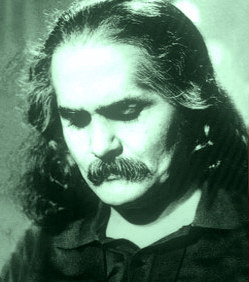Famed Persian Poet Pays Tribute to Mossadegh
| Ebrahim Norouzi, MD |
 Mehdi Akhavan Sales (pronounced sah-less) (1928-1990) a prominent contemporary Iranian poet, was 28 years old when he was incarcerated for his political activism following the fall of Mossadegh’s government.
Mehdi Akhavan Sales (pronounced sah-less) (1928-1990) a prominent contemporary Iranian poet, was 28 years old when he was incarcerated for his political activism following the fall of Mossadegh’s government.
The Zerehi military prison where he was confined happened to be where Dr. Mossadegh was serving a three year term in solitary confinement. Though Akhavan had no direct contact with Mossadegh, he would occasionally see him from a distance when the former Prime Minister was allowed out of his cell and into the prison yard. Akhavan describes Mossadegh, in his “robe-de-chambre” inside a special fenced-off area, walking alone like a “lion in a cage”.
In April 1956, while still in prison, Akhavan Sales wrote his famous ode to Mossadegh in appreciation of the “sufferings that he endured in the service to the nation”. The poem is in the form of free verse, a style of Persian poetry that Akhavan himself helped pioneer.
At the time, under the Shah’s military dictatorship, Mossadegh had a persona non grata status and even mentioning his name would have brought, as Akhavan said, “strange and unknown” consequences. Thus, he titled the poem: For Pir Mohammad Ahmadabadi as a partially disguised reference to the elderly sage, who would return to his home village of Ahmadabad for house arrest in August of that year. Akhavan referred to his tribute as a “consolation and greeting”.
Akhavan’s most famous poem, Winter was also published in 1956 and subsequently translated into many other languages. In it, Akhavan describes a chilly winter scene where no one dares to say hello, a metaphor for the oppressive social and political atmosphere during the West-supported Pahlavi regime.
Akhavan Sales died in August 1990 in Tehran. He is buried in Tous, near his birth city of Mashad, in the grounds of the tomb of Ferdowsi, the Persian epic poet.
In 2012, Akhavan’s poem for Mossadegh was revived with the accompaniment of musician Majid Derakhshani and singer Pouria Akhvas. The performance is shown in this video, with Akhavan’s voice heard as well. Also presented here is the original Persian text of the poem, as well as audio of Akhavan reciting it.
برای پیرمحمد احمدآبادی
by Akhavan[English translation here]
دیدی دلا که یار نیامد ؟
گرد آمد و سوار نیامد
بگداخت شمع و سوخت سراپای
و آن صبح زرنگار نیامد
آراستیم خانه و خوان را
و آن ضیف نامدار نیامد
دل را و شوق را و توان را
غم خورد و غمگسار نیامد
آن کاخ ها ز پایه فرو ریخت
و آن کرده ها به کار نیامد
سوزد دلم به رنج و شکیب
ای باغبان، بهار نیامد
بشکفت پس شکوفه و پژمرد
اما، گلی ، به بار نیامد
خوشید چشم چشمه و دیگر
آبی به جویبار نیامد
ای شیر پیر بسته به زنجیر
کزبندت ایچ عار نیاید
سودت حصار و پیک نجاتی
سوی تو و آن حصار نیامد
زی تشنه کشتگاه نجیبت
جز ابر ز هر بار نیامد
یکی از آن قوافل پر با
ران گهر نثار نیامد
ای نادر نوادر ایام
کت فرو بخت یار نیامد
دیری گذشت و چون تو دلیری
در صف کارزار نیامد
افسوس کان سفاین حری
زی ساحل قرار نیامد
و آن رنج بی حساب تو، درداک
چون هیچ در شمار نیامد
و ز سفله یاوران تو در جنگ
کاری بجز فرار نیامد
من دانم و دلت که غمان چند
آمد، ور آشکار نیامد
چندان که غم بجای تو بارید
باران به کوهسار نیامد
Related links:
Famed Persian Author Iraj Pezeshkzad Remembers Mossadegh
A final goodbye to Mossadegh — by Shirin Samii
A collection of Allen Ginsberg’s Poems About Mossadegh
MOSSADEGH t-shirts — “If I sit silently, I have sinned”






